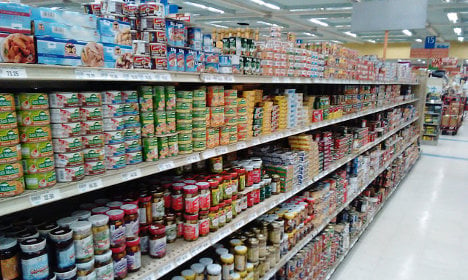HEALTH
French warned over heavy metals in canned tuna
In a report set to be published in May, the magazine 60 Millions Consumers has warned the public about the dangers of eating certain canned tuna. Find out which.
Published: 21 April 2016 10:56 CEST

Photo: Iwan Gabovitch/Flickr
Leading consumer group 60 Millions de Consumateurs has come out with another worrying report, just weeks after over 100 supermarket items and household products were blacklisted for their dangerous contents.
The group studied 15 popular brands of tuna including Petit Navire, Saupiquet, and Connétable, as well as those from retailers like Carrefour, Auchan, Leader Price, and Casino.
It found that while none of the tuna cans contained Bisphenol A (also known as BPA – a compound used to make plastic), there were plenty of other worrying things inside France's tuna cans.
For example, all the brands tested contained the metals mercury, arsenic and cadmium – but all to different degrees.
The report suggested that if you're still going to be angling for tuna no matter the contents, your best bet is Leader Price, due to having the lowest metal levels overall.
Three tuna brands were singled out containing more than the regulatory amount of mercury, which is 1 mg per kg. These were Petit Navire, Capitaine Nat' and Odyssée (from Intermarché).
When it came to arsenic levels, Capitaine Nat' clocked up 1.7mg per kg, a rate nearly six times as high as that from Carrefour's home brand.
But, unless you're pregnant, you shouldn't be overly concerned, said health expert Dr Alain Ducardonnet.
“Sure, there are traces of mercury in fish, but only in infinitesimal quantities,” he told BFMTV, adding that the metal plays a part in the functioning of cells and enzymes.
He added, however, that it could be harmful to the brain development of unborn children, the channel reported.
“Pregnant women should eat fish in limited quantities,” he said.
Besides potentially dangerous metals, the study also found that France's tuna cans contained some unsavoury products, three of the brands containing traces of tuna heart.
Five of the products had a notable amount of bones inside, and tuna from the brand Cora even contained traces of the fish's reproductive egg cells.
The magazine was quick to note that the codes of practice don't actually prohibit other parts of a fish (besides fillets) being inside the tin, but added that these were “unappetizing ingredients” to say the least.
To order the May issue of the mag, click here.
Url copied to clipboard!


 Please whitelist us to continue reading.
Please whitelist us to continue reading.
Member comments